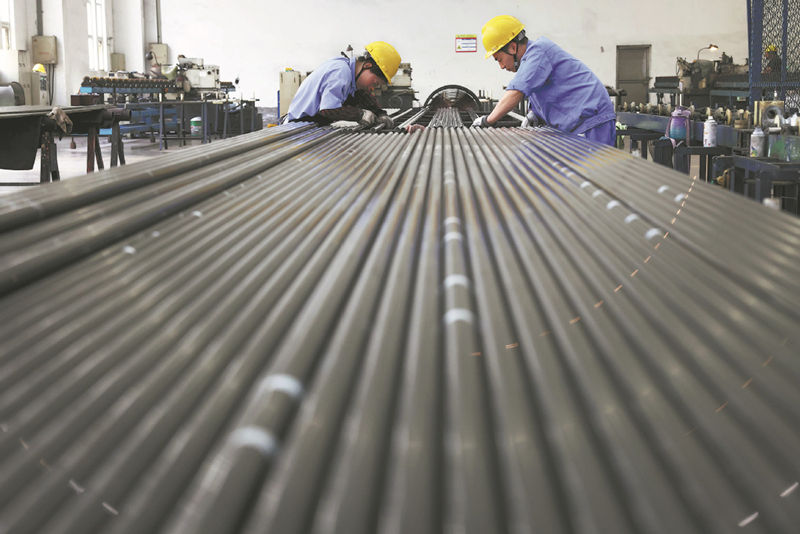
Employees work on the production line of a factory in Ningde, Fujian province, in May. Wang Wangwang / For China Daily
Involution is a process of diminishing returns to scale that contributes little to development. "Involution-style" competition can refer to corporate decision-making behavior in a scenario where "supply-side expansion continues while demand-side response lags". Such behavior stems from irrational competition intensifying under the pressure of the stock market.
Maintaining industry competition, on the other hand, requires a fair competitive environment, curbs on unfair competition and the prevention of monopolistic practices. "Anti-involution" does not restrict market competition, it opposes irrational competition, unfair competition and monopolistic behavior. "Anti-involution" is an important initiative to create a fair competitive environment.
When faced with an uncertain market environment and increasingly tight resource allocation, companies tend to try and seize market share by cutting costs, thereby creating involution in the market. This not only hinders the optimal allocation of resources but also suppresses technological progress and organizational efficiency, preventing companies or industries from achieving qualitative breakthroughs and ultimately trapping them in a dilemma of "more investment for no results" and employees in "more work for less pay".
Involution manifests in vicious price wars, exclusionary agreements, abuse of market dominance and false advertising. These practices undermine normal market order and resource allocation efficiency.
Hence the government must introduce more policies to help enterprises and industries address the challenges of involution.
First, it is essential to stimulate innovation and the upgrading of manufacturing by improving the technological innovation mechanism, which is the core path to achieving high-quality development in the manufacturing sector. At the policy level, it is recommended to strengthen the technological innovation orientation of industrial subsidies, restrict subsidies aimed at capacity expansion and incentivize enterprises to actively engage in standard-setting, technological originality and brand development.
Second, efforts should be made to optimize the innovation synergy of industry chains so as to build a mutually beneficial ecosystem. Introducing and refining industry chain innovation policies to guide companies toward technological innovation and product upgrading will further curb involution in supply chains.
Large State-owned enterprises and research institutions should promote the open sharing of scientific research achievements, and enhance the technical support and collaboration mechanisms. This will help upstream and downstream enterprises form a synergistic innovation ecosystem, boosting the international competitiveness of industry chains and enhancing self-reliance in core technologies.
Third, the government should optimize the structure of domestic demand and unleash consumption potential, which is one of the fundamental ways to alleviate involution. Efforts should be made to advance reforms in the income distribution system, optimize the income distribution structure and enhance residents' actual consumption capacity, providing more stable and high-quality market demand for manufacturing.
The integrated development of manufacturing and services is also essential to cultivate new consumption scenarios and demand growth points. This will inject sustained momentum into the transformation and upgrading of manufacturing.
A market free from involution is one with a well-developed self-regulatory mechanism, and one where the practices of unfair competition are incorporated into corporate credit records and linked to government procurement and financing support.
A long-term governance framework should steer enterprises toward standardized and sustainable development.

Copyright © General Office of Fujian Provincial People's Government
Website Identification Code 3500000049Registration Number: 15003084
All rights reserved. The content (including but not limited to text, photo, multimedia information, etc) published in this site belongs to fujian.gov.cn.
Without written authorization from fujian.gov.cn, such content shall not be republished or used in any form.